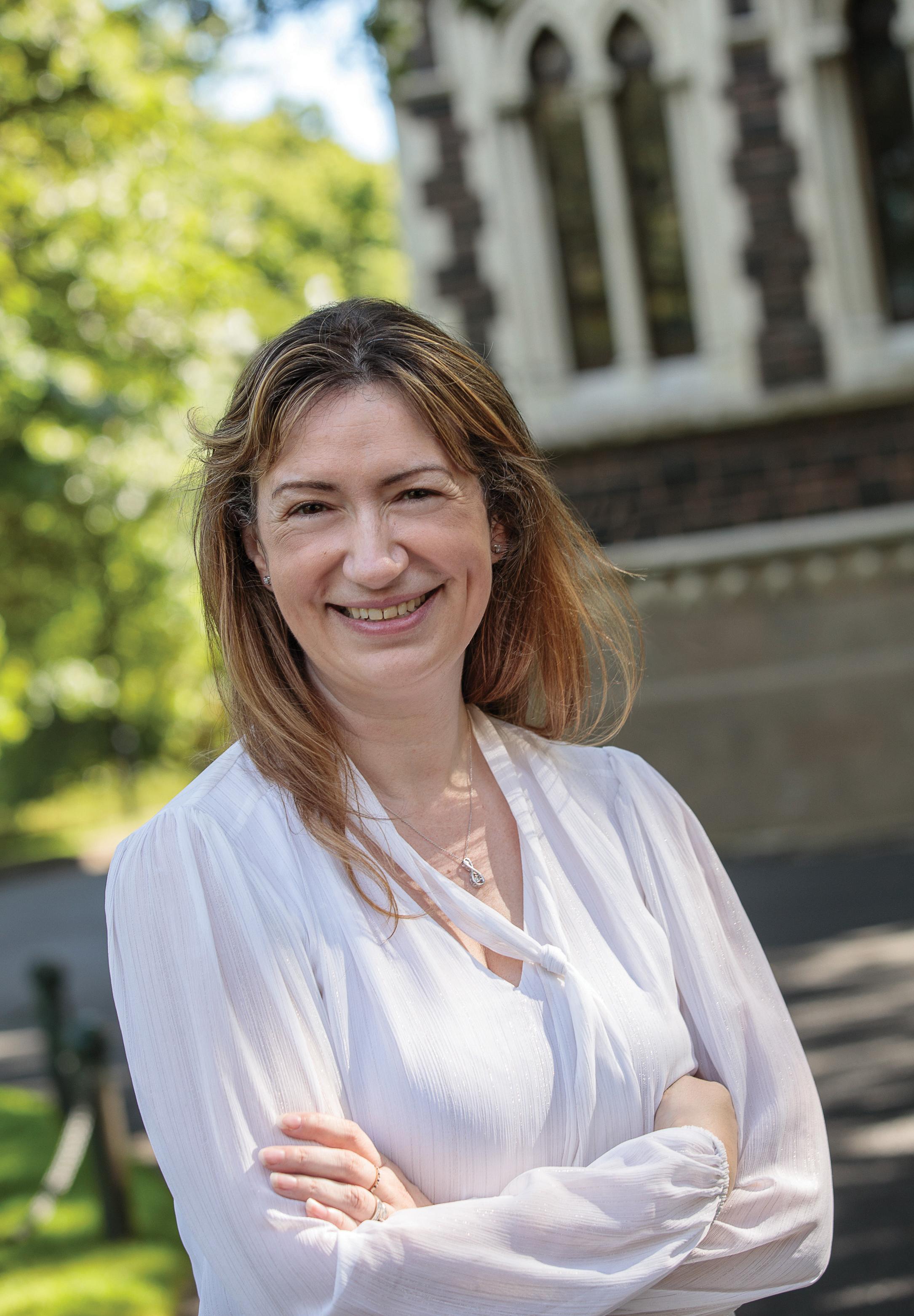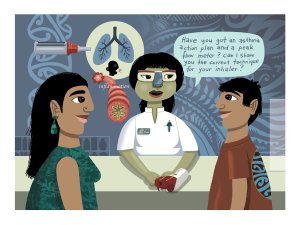Academic pharmacist Nataly Martini discusses the medical management of asthma in adults and adolescents, which has evolved to prioritise early anti-inflammatory treatment. She also explains how to improve patient outcomes by proactively identifying poor asthma control and supporting equitable access to education and treatment
PSNZ president’s plan to reshape health sector to benefit pharmacy
PSNZ president’s plan to reshape health sector to benefit pharmacy

We are on our summer break and the editorial office is closed until 17 January. In the meantime, please enjoy our Summer Hiatus series, an eclectic mix from our news and clinical archives and articles from The Conversation throughout the year.
Remember the start of the year when Aotearoa was COVID-free? New PSNZ president Professor Rhiannon Braund was taking up the reins and explains her goals for improving the fortunes of pharmacy. She spoke to Jonathan Chilton-Towle
New Pharmaceutical Society (PSNZ) president Rhiannon Braund believes convincing policy makers to take action on the copayment will be key to healing growing rifts in the pharmacy sector.
Professor Braund, who was elected to the role of president in late November, says “the lines being drawn” around free prescriptions by pharmacy chains such as Chemist Warehouse and Countdown have created a rift between pharmacists.
She says the society is about promoting a strong profession and she wants to heal the disunity.
“Chemist Warehouse is scary for a lot of people. But there are still some great pharmacists that work in those pharmacies. What causes the friction is the business model.”
But this friction makes it difficult to act on behalf of the entire sector when negotiating with the Government.
Professor Braund believes it is government ambivalence about the pharmaceutical copayment that has allowed the discounting business model, which uses a tax as a loss leader, to flourish.
While the Australian Government intervened and allowed Chemist Warehouse to discount by only a dollar on the script cost, in New Zealand, successive governments have taken no action, despite repeated complaints from pharmacists.
We have an enthusiastic, passionate, capable workforce, who just feel they haven’t been given their wings yet with the way the health system is
In December, new health minister Andrew Little confirmed to Pharmacy Today he had no plans to look at copayments in the near future but that he is aware of the issue.
“It’s not a no, it’s a ‘not yet’,” Professor Braund says, adding she is hopeful the issue will be looked at in the aftermath of the Health and Disability System Review (HDSR) report.
Professor Braund believes arguing that the copayment situation is unfair will not convince the Government to take action. Instead, the sector needs to drive home the message that free medicines are not the only way to reduce inequity; and a clear policy on how medicines are accessed and supplied in New Zealand is required.
Discounting now means a two-tiered health system exists, where some New Zealanders who live near a discount pharmacy can access free medicines, and others, particularly in rural areas, cannot.
This is not based on patients’ needs and creates inequity. In addition, the medicines patients get for “free” still have to be paid for, leading to increased cost on the wider health system due to increased demand.
“Where is the policy conversation? Where is the medicines policy? We don’t have a strong medicines policy. It has been allowed to happen because no one has come into this space and spoken about what this actually means,” Professor Braund says.
A practising pharmacist and high-achieving academic, Professor Braund is well placed to have these discussions with policy makers.
In 2020, she became the first female pharmacist to be made a professor at the University of Otago.
Professor Braund was a clinical pharmacy lecturer at the Otago School of Pharmacy for 15 years, and now works at the New Zealand Pharmacovigilance Centre in Dunedin.
Her academic expertise includes medication use, safety and effectiveness, adherence and wastage; along with research into advanced roles for pharmacists and support staff resulting in multiple practice changes and the creation of new models of care.
She was involved in the 2014 reclassification of sildenafil, allowing trained pharmacists to prescribe it, and has been a key researcher into interprofessional roles pharmacists can fill, including working in GP clinics.
She has won multiple awards over the years, including the Prime Minister’s award for Tertiary Teaching Excellence in 2012 and a fellowship from the PSNZ in 2018. Earlier, in 2008, she took home the Otago University Students’ Association Teacher of the Year Award.
Aside from her academic career, Professor Braund has also been involved in pharmacy sector governance for years through the PSNZ. She was elected Otago branch president in 2007.
She was the society’s vice-president until former president Ian McMichael stepped down late last year.
Aside from a natural ability to “see how things can be better”, Professor Braund says it is the trust placed in her by others that motivated her to put her name forward for leadership opportunities.
She is also passionate about challenging narratives about the traditional role of women and is a member of Wāhine Connect, a mentoring network for New Zealand women in health.
Professor Braund has also somehow found the time to raise two children, now aged 10 and 14.
Professor Braund’s early experiences as a locum while she was studying for her PhD in the early 2000s made her realise many New Zealanders have very little understanding of pharmacy and medicines.
In 2003, just after stat dispensing replaced monthly dispensing in pharmacy, she recalls a patient coming in and receiving two large supermarket bags of medicines and being told it would cost $15.
Professor Braund was shocked to find the patient was upset at the high cost.
“It really made me think about how people view their medicines.”
Professor Braund believes people have lost respect for medicines, which are seen as a cost rather than a valuable medical intervention, and patients do not understand the essential role pharmacists play in public safety.
Professor Braund also plans to advocate for fundamental changes to how pharmacy is funded, saying that if something is not done soon, the sector will “crash”.
Pharmacy incomes are tied to factors they cannot control, such as the ageing population, greater medicines uptake and the cost of medicines.
In addition, health sector funding is fragmented, making it difficult to achieve savings across the whole system. For example, she says, if Pharmac spent more money on diabetes medicines fewer patients would end up on dialysis, thus reducing costs for DHBs.
Despite the obvious advantages, under the current system Pharmac would see no benefit to its own budget, which discourages it from taking such action.
She hopes the Health and Disability Sector Review report will lead to the separation of the cost of pharmaceuticals from the cost of supplying medicines, as well as more money being invested upfront in pharmacy medicines optimisation and rationalisation.
To achieve the Government’s plans for pharmacists to offer more clinical services, a separate funding stream is needed, Professor Braund says.
“We keep hearing DHBs are in deficit and that’s true, but money should be reinvested. Money spent in primary care keeps people out of hospital and therefore saves more money down the line.
“We have an enthusiastic, passionate, capable workforce, who just feel they haven’t been given their wings yet with the way the health system is. We need to reshape what it looks like.”






